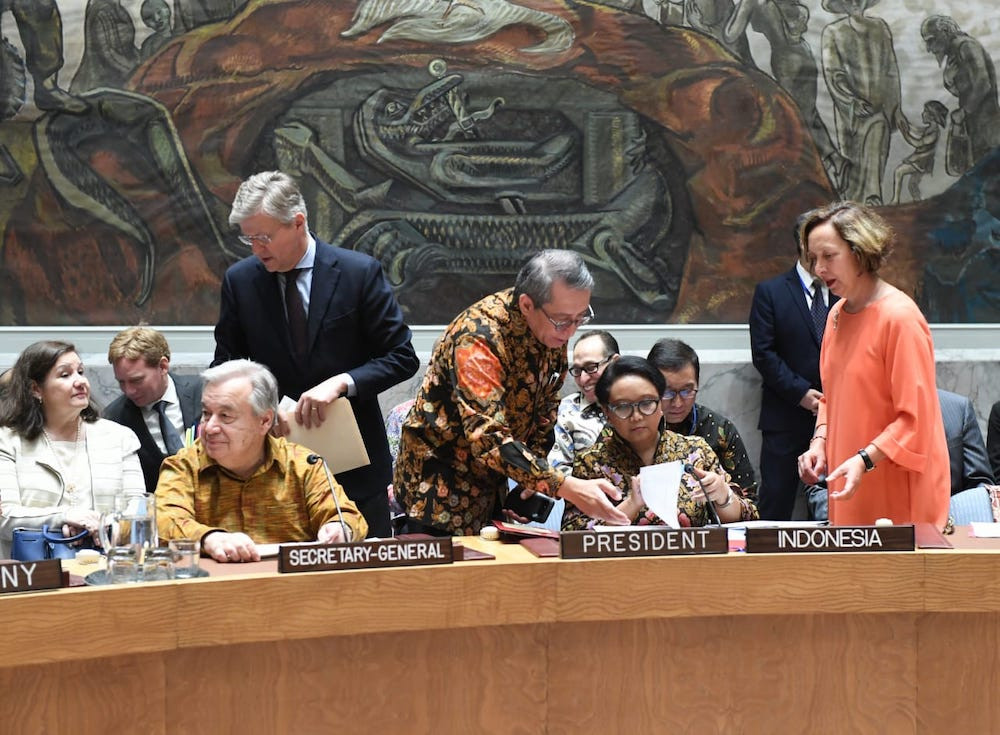Popular Reads
Top Results
Can't find what you're looking for?
View all search resultsPopular Reads
Top Results
Can't find what you're looking for?
View all search resultsIndonesia’s election diplomacy matters
In the last three years, Indonesia has recorded 35 impressive election victories in various organizations.
Change text size
Gift Premium Articles
to Anyone
O
ne year ago, an unusual scene played out in the United Nations Security Council chamber, where UN Secretary-General Antonio Guterres sat side-by-side with Foreign Minister Retno Marsudi, wearing batik. All eyes were on Indonesia, which was serving as president of the UN Security Council in May 2019.
A year later, Indonesia was elected consecutively to two main organs of the UN: the Human Rights Council and the UN Economic and Social Council (ECOSOC).
Indeed, it’s not the first time Indonesia managed to score a victory in three major UN organs consecutively. Yet it happened again. As such, this successful track record has proven that, once again, Indonesia has gained the international society’s trust to contribute to world governance on various issues.
In the last three years, Indonesia has recorded 35 impressive election victories in various organizations, from the international organizations (IOs) within the UN system and specialized agencies (UNESCO, IMO, IAEA, WMO) to other IOs like the Organization of Prohibition of Chemical Weapons (OPCW), Asia Productivity Organization (APO) and International Coconut Community (ICC).
Indonesia’s election diplomacy is part of its multilateral diplomacy, as it aims to achieve its national interests through its membership in international organizations. As a member of 200 international organizations, Indonesia has the responsibility to make financial contributions to them.
It also has the right to be involved in them, either as a regular member or as a governing body member. A governing body is a small group of members responsible for an organization’s decision-making process. It is formed through a contested election among its members.
Why does Indonesia’s election diplomacy matter?
First, the remarkable election record of Indonesia reflects the trust of the international community in Indonesia’s global credibility as an aspiring middle power and bridge builder among nations over diverse issues, from security and peace to human rights, economics, social development, and maritime and cultural issues. Indonesia has utilized this trust by demonstrating excellent leadership in various prominent positions.
The presidency of Indonesia in the UN Security Council last August was a clear example of admirable leadership. Indonesia managed to convince the UN Security Council to pass the resolution on female personnel in UN peacekeeping missions – the first of its kind in the history of the council.
Second, the consecutive victories were the product of the relentless efforts of Indonesian diplomats across the globe. Most of the elections in IOs were contested elections, meaning each country had to compete for limited seats. This required a continuous effort of intensive lobbying of all members of the IOs through diplomatic receptions, vote exchanges, demarches, or even the deployment of special envoys. The smooth coordination between diplomats in the Foreign Ministry in Jakarta and diplomatic missions all over the world was, of course, indispensable.
Third, running for a prominent IO position is the deliberate projection of the Indonesian foreign policy doctrine of being “independent and active”. Indonesia is mandated by the Constitution to participate in establishing a world order based on freedom, perpetual peace and social justice. Actively contributing to global governance is indeed part of the country’s DNA.
Fourth, and most importantly, winning the election brought many tangible benefits to Indonesia’s diplomacy. The successful election will allow Indonesia to have central involvement in decision-making processes at IOs.
Indonesia will be able to assert its national interests by setting an agenda or even dismissing agendas that may threaten its interests. It also has more substantial bargaining power on the global political stage, especially for future elections at IOs.
The UN Security Council membership has great influence on maintaining world peace and security, given the additional votes to elect an International Court of Justice (ICJ) member. Indonesia has a comparative advantage in elections at ECOSOC subsidiary bodies such as the Commission on Narcotic Drugs, Committee on Non-Governmental Organizations, Commission on Population and Development and Commission on the Status of Women.
Having more votes will be useful because Indonesia may gain leverage from this for its current and upcoming elections.
With many prominent elections ahead, Indonesia’s leverage as an emerging middle power is even more significant than before. Many countries have approached Indonesia more frequently than before.
Indeed, the future of Indonesia’s multilateral diplomacy seems bright.
***
The writer is director general for multilateral cooperation at the Foreign Ministry. The views expressed are his own.










